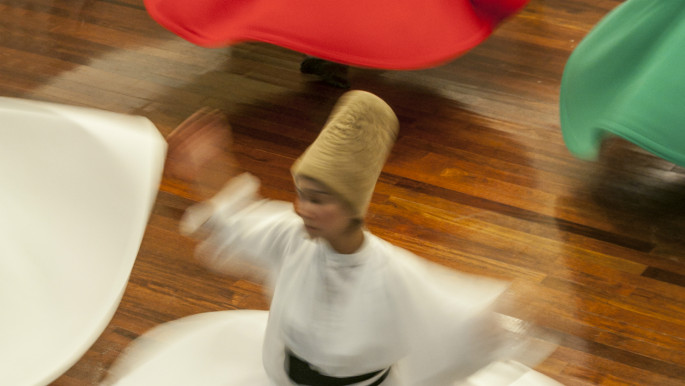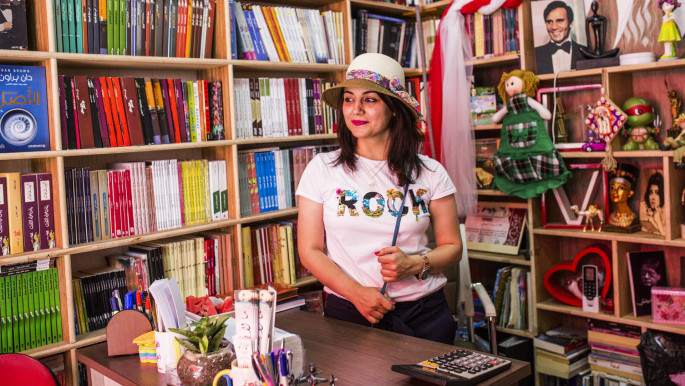Iraqi poets face threats for criticising government corruption
Turkey was meant to be a safe haven for Iraqi poet Samah Farqad. But less than two months after moving to the country and within the walls of her new home, Samah was attacked. Since then, safety and security dominate her every move.
A year later, Samah still recalls the attack in vivid detail. "It was surreal. I felt unconscious," she says. "I remember screaming. I then woke up in a hospital with bandages around my head."
No one has been arrested over the attack, and the incident was cast aside as an assault by an unknown suspect. Although Samah could not see her attacker's face, she does believe that the attack is linked to death threats she had first received when she was in Iraq – which were the very cause of her flight to Turkey.
Samah is a talented poet from the city of Basra, one of Iraq's most important governorates, with huge oil reserves that are the central driving force of the Iraqi economy. Her poetry is bold for a woman of her young age living in a society bound by tribal traditions and religious customs. In her latest poem, entitled Azrael, she accuses the country's politicians of handing over cities such as Mosul, to the Islamic State [IS] group.
"My poem Azrael was well-received by the public, to the extent that one TV station kept broadcasting it," Samah says. "Perhaps this angered some people, particularly those men in power. They wanted to silence me, so my family and I started receiving threats, which included fabricating images of me and sending them to my husband to cause a scandal."
 |
|
| Read also: Unravelling Palestinian feminine mysticism in the Sufi corners of Nablus |
Yet Samah is not the only Iraqi poet paying a price for her courage. Social networking sites are now filled with the verses of young Iraqi poets who use their words to criticise the government and political parties over corruption, lack of services and the absence of law. It is precisely these critiques, which have reached a wide audience and been able to garner support, that has authorities in Iraq alarmed.
A red line
A number of poets have compared present-day Iraq's powerful political parties with that of the former Baath regime. While their audiences see this as licence of poetic expression, the comparison are often seen as a glorification of Saddam's Baath regime. In Iraq today, such a comparison is a red line that could land any who cross it with a 15-year jail sentence.
Last year, a video showing another popular Iraqi poet, Khalil al-Jubouri, reciting one of his verses quickly went viral.
Khalil was standing amid a crowd who were receiving the head of the National Wisdom Movement party, Ammar al-Hakim in a visit to the Karbala province. In the video, Hakim can be seen smiling as he stood listening to Khalil's verse, unaware that the poem would come to be describe the country's politicians as thieves who are worse than Saddam Hussein.
Khalil can be seen reciting in the video:
"The people sacrificed much, and now we have plenty of orphans,
Before it was one Saddam, but now it is one thousand Saddams,
We have plenty of resources, but the parties have stolen them all."
After hearing this, Hakim stormed off angrily. However in a later clip, Khalil was filmed holding the politician's hand asking for forgiveness. One of his neighbours said that he was forced to apologise on camera after receiving death threats from Hakim's security men.
"Hakim's supporters even demanded from Jubouri to write a poem praising the politician," the neighbour said, speaking on condition of anonymity.
"Khalil stopped writing poetry since that day," he added.
In the southern Dhi Qar province, young poet Salah al-Harbawi caused a similar uproar. Following a visit by US President Donald Trump to Iraq, Harbawi recited a poem during an event commemorating the death of a Popular Mobilisation Forces fighter. This was however seen as glorifying Saddam Hussein
In his poem, Salah said:
"He orders a strike so powerful; it pierces through the clouds above us,
And just like that our positions flip,
Trump becomes my host and I become his guest,
Oh Saddam, I hate you, but I love you,
Because you would never let the aggressor into your home."
Shortly afterwards, Salah was arrested and held for a few days. Images of him dressed in an orange jumpsuit – usually worn by prisoners on terror charges – were soon released on social media.
Poet Sultan Ghanem, who followed Salah case closely, spoke to The New Arab.
"Salah's clan members intervened to release him and urged him to write a new poem to clarify that he did not intend to praise Saddam," Sultan said. Salah himself refused to speak to The New Arab about the incident due to the pressure he received.
In both the cases of Khalil and Salah, reaction from governmental authorities focused on the poets' alleged praising of the previous Iraqi regime. This sought to draw attention away from what the poets intended subject – namely, state corruption and the deterioration of the country.
Forced disappearance or give up writing
 |
|
| Read also: The Baghdad bookseller: How one woman hopes to revive the literature scene in Iraq |
Similarly, an ode entitled Exclusive for Men wearing Turbans by young poet Dia al-Dakhil saw a number of users praise the poem for expressing their own wounds and disappointment in Iraq's rulers.
Dia's words stung, as he described the leaders of religious parties as "thieves in religious attire" who "live in palaces when they once walked barefoot".
He wrote:
"Exclusive for the men wearing turbans who live in palaces,
Who once walked the streets with barefoot,
The turbans you put on for God, how can you use it to loot,
Your turbans are false, you are all thieves."
A series of death threats meant Dia was forced to flee Iraq over a year ago. He spoke to The New Arab, without disclosing his location.
"I received death threats from a well-known militiaman, whose exact words were: 'we will get you, even if you are aboard'," he says.
His poem was written in 2018 and remains a source of discomfort to authorities as it still circulates online on certain occasions.
Although Dia continues to boldly write poetry, he is extremely cautious of his movements and often rejects invitations to recite his poetry in public. Dia remains aware that the politicians who sent shadowy figures to target him inside Iraq may still be able to reach him outside the country.
"There are also electronic armies belonging to influential people in the state, who target the online accounts of poets and journalists and intimidate them with messages of threats," Dia tells The New Arab.
The situation faced by poets in Iraq today reminds poet Walid al-Khashmani of his own experiences 15 years ago when he too fled to Turkey.
"If I had stayed in Iraq, I would be unable to write poetry or even alive!" he says.
Walid was dubbed "the poet of resistance". One of his most renowned work is a piece entitled Asa'ib Men in which he criticises the members of the Asa'ib Ahl al-Haq militia – a paramilitary group founded in 2006.
In his poem, Walid accuses members of the militia of robbing the poor. He now says he is still paying the price for his words.
"I was subjected to persecution and threats by both Islamic State group militants and the Iraqi militiamen. I was imprisoned in Erbil for nine months," he tells The New Arab.
"I fled to Turkey after that, and I still move houses frequently because I feel I am still in danger and that they might be able to reach me if I stay put."
Walid maintains however that poets must pursue their activism by using their words to address state corruption.
"There are many courageous poets out there, but they are mostly pursued by authorities," he said. "The result is that some are forced to apologise for their words, others are forced to flee for their lives, or they are silenced forever.
"It is difficult to communicate our ideas, as it is very risky," he said. "There are even poets who receive protection from political parties in return for praise."
Walid chose exile so he may continue to write freely, although he feels that his life is still in danger.
In March, he released a new poem entitled The Nineveh Tragedy, in which he spoke about the sinking of a ferry in the Tigris river near Mosul, which he blamed on the corruption and negligence of local authorities.
The incident saw a ferry transporting families to a tourist area on Umm Rabaen island in the Tigris in March capsize, throwing all those on board into the river which was swollen by heavy rainfall.
The incident killed almost 100 people, including women and children and resulted in the sacking of the Nineveh governor and his two deputies.
Just like Walid, Samah now carefully calculates her every move and takes precautions to avoid another attack like the one she went through over a year ago.
"Since we left Iraq, we have been living in a difficult situation because of the high cost of living in exile, but our only other option is to die by an anonymous bullet," Samah says.
Her alienation, however, has enabled her to continue to write verse for her followers in Iraq. In her latest poem Azrael – named after the angel of death, she addresses Prime Minister Adel Abdul Mahdi, urging him to end corruption and plunder, and to meet the demands of the people who want a better standard living and an end to their suffering.
"Azrael where are you? I want to have a word with you.
Why don't you go after those who we don't want to stay?
Why are you haunting us? Leave us alone!
Why do you only come after those dear to my heart?
We are tired of the poverty and politics,
So many souls have left, but theirs did not leave.
They are still in their place, with their pockets full,
Fighting over their own interests.
Why should the nation go hungry when the land itself is full of wealth?
Afrah Shawqi is an Iraqi journalist, born in Baghdad. She graduated from the Media Faculty of Baghdad University in 1998, and has been writing for several Arabic and international publications, including the London-based Al Sharq Al Awsat and niqash.com. She was active with civil society organisations and participated in several demonstrations against corruption in Iraq. She was forced to leave Iraq with her children after she was kidnapped by armed militias in 2017. She was released after a nation-wide campaign and currently lives in France as a refugee. She is also a member of the The Marie Colvin Journalists' Network





 Follow the Middle East's top stories in English at The New Arab on Google News
Follow the Middle East's top stories in English at The New Arab on Google News


